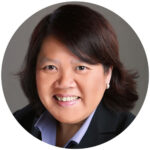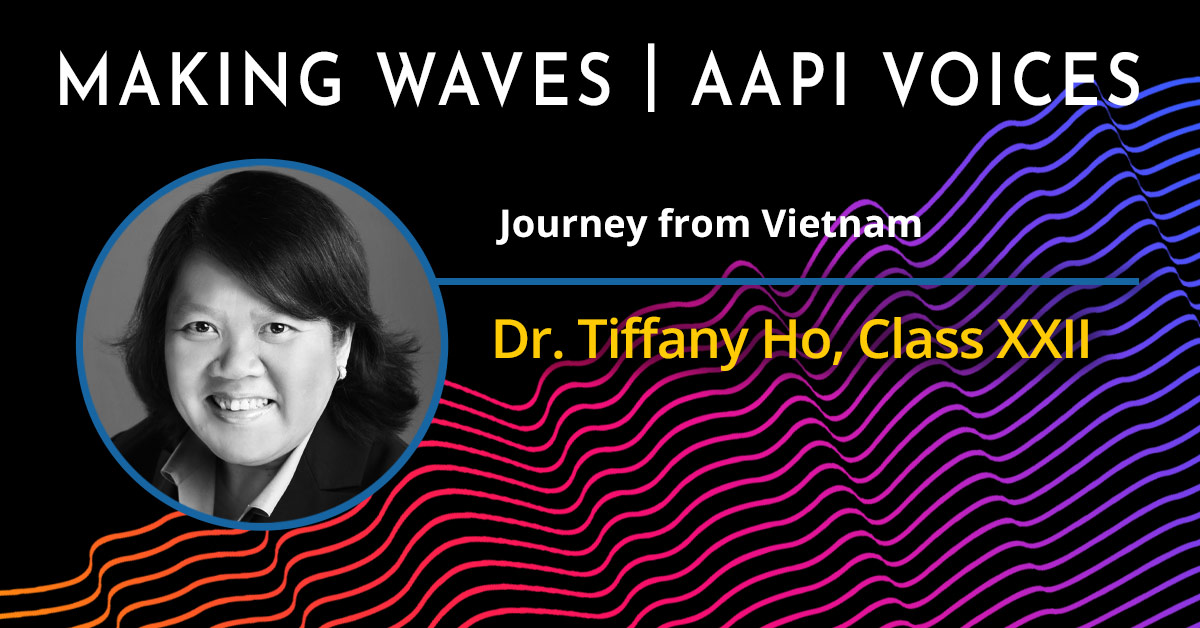Journey from Vietnam
All of us are called to be of service to others, and in the best of worlds, our story—our own life—leads us to career choices that allow us to make that happen. This is my story, a story with messages of love, trauma, hope, resilience, and joy.
I was born in the late 60s, at the height of the Vietnam War. When I was seven, my country was taken over by the North Vietnamese Communists. Overnight, my Dad, who was a high school teacher, was taken to a Communist forced labor camp and incarcerated indefinitely without receiving a sentence. Life was unbearably difficult for my Mom and us four children who ranged in age from five to twelve. During this time, my family never had enough to eat. As latchkey kids, we were left to take care of one another as Mom had to work several jobs to put food on the table. In addition to being the sole breadwinner for our family, she heroically saved whatever she could to obtain critical food and medicine for my Dad. We were only allowed to visit him every few months under austere conditions. Though these far-away family visits were brief and tightly monitored by the captors, they were so special to me as a young child. I tried to keep whatever connections I could to my Dad and to continue to cheer him up.
“We would be smuggled out one at a time on different boats because it was estimated that only a third or half of those who escaped would make it across the Pacific Ocean.”
Because the conditions in Vietnam were so difficult, my parents decided to use whatever savings they had to smuggle us children out of Vietnam but could only afford to do so for two children. Which two? My parents were faced with heart-wrenching decisions and chose to have my older brother and me escape – my brother because they were worried that he would have been drafted into another Vietnam war once he turned sixteen. And me because they thought I would be likely to survive in another country without their support. We would be smuggled out one at a time on different boats because it was estimated that only a third or half of those who escaped would make it across the Pacific Ocean.
Many boat people perished at sea due to stormy weather, pirates, illness, or lack of food and water.
On a dark night, I was smuggled out of Vietnam without being able to say goodbye to my family and my friends. Our boat, with a broken engine, was adrift for several days, and with our water supply running low, we were severely dehydrated. When our boat was finally rescued, many of the passengers were quite ill and needed immediate medical attention. After intensive and difficult negotiations, we were reluctantly accepted by the Philippines government and were allowed to disembark at a makeshift refugee camp. I stayed there for several months, waiting to be processed by the US government, and was resettled in the care of relatives.
My middle and high school years were tough. I missed my family terribly and felt lonely and alone much of the time. I threw myself into schoolwork and spiritual readings to cope with the adjustment. I also worked several hours a week to help my aunt and uncle with their laundromat, washing, drying, and folding clothes for customers. After five years of arriving in the US as a refugee child, I was accepted to Princeton University as a first-generation college student and studied to be a doctor.
“From witnessing the historical trauma that my family and our country went through, I always knew it was my calling to devote my life to public service and to be a healing force to those who face significant adversities.”
After six years of forced labor, my Dad was released from the Communist re-education camp. It took another ten years for me to be reunited with him and the rest of my family through the State Department’s Humanitarian Program. They were able to come just in time to share the joys of my graduation from college.
Through hard work, sheer determination, and the support of family, friends, and mentors, I completed several years of training to become a community psychiatrist. From witnessing the historical trauma that my family and our country went through, I always knew it was my calling to devote my life to public service and to be a healing force to those who face significant adversities. For me, the following quote from Helen Keller rings true, “Character cannot be developed in ease and quiet. Only through experience of trial and suffering can the soul be strengthened, ambition inspired, and success achieved.” I wanted to close my reflections by honoring my family for their immense sacrifices, grace, and love.

Dr. Tiffany Ho is the Executive Behavioral Health Medical Director for the County of Santa Clara Health System and a member of ALF Class XXII.
About Making Waves | AAPI Voices
This article is part of the Making Waves – AAPI Voices project by ALF Silicon Valley’s AAPI Caucus. Through an ongoing series of letters and other forms of creative expression by ALF Senior Fellow guest contributors, we aim to share the experiences of Asian Americans & Pacific Islanders (AAPIs) with the broader ALF network. We are proud of AAPIs’ contributions to our multiracial society and believe we can help strengthen our community and democracy by sharing our stories to build understanding and solidarity.
View all current contributions to this series here.
The title of this project, Making Waves – AAPI Voices, is inspired by the book Making Waves, An Anthology of Writings By and About Asian American Women. We thank editor Dr. Elaine Kim and Asian Women United of California for their groundbreaking work and permission to use the title.
Tell us what you think. Want to start a dialogue? Contact Akemi Flynn.




